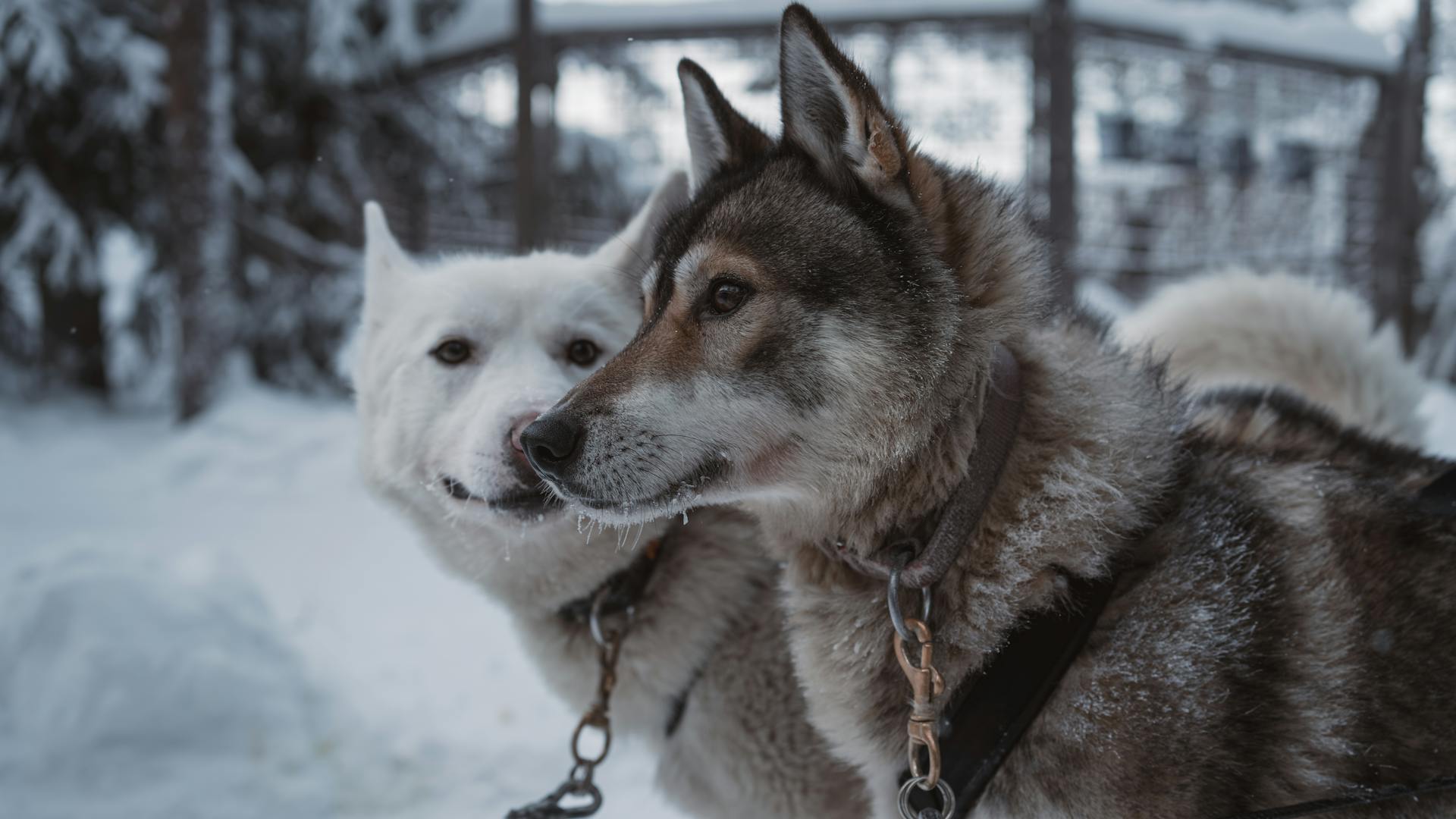
As the temperatures drop, you might be wondering if your furry friend needs more food to stay healthy. The answer is not a simple yes or no. In fact, dogs have different nutritional needs depending on their age, size, and activity level.
Some dogs, like larger breeds, may need more calories to maintain their weight and energy levels during the winter months. This is because they burn more energy to stay warm, just like humans do.
However, other factors, such as your dog's age and health status, can also impact their nutritional needs. For example, older dogs may need fewer calories due to decreased metabolism, while dogs with health conditions may require more nutrients to support their overall health.
As a dog owner, it's essential to consult with your veterinarian to determine the best diet for your furry friend during the winter months.
Discover more: Ear Cropping Age
Do Dogs Need More Food?
Dogs need more food in winter, especially if they live outdoors in four-season locales. Their bodies use a lot of energy to keep warm, which means they need two to three times their normal amount of calories.
Shivering is a major energy drain for dogs, and they may need to eat more to compensate. This can lead to fat accumulation, which is a natural response to the cold weather.
A dog's metabolism changes in cold weather, causing their body to preferentially use fat rather than glucose for energy. This means they may benefit from a dog food that's higher in fat.
The amount of food your dog needs will depend on various factors, including their size, coat type and length, and outdoor shelter.
For more insights, see: Dog Food for High Energy Dogs
Temperature and Weight
Dogs housed outside in the winter need two to three times the normal calories as they need at a more moderate temperature.
As temperatures fall, owners are less inclined to exercise their dogs due to their own discomfort in the colder weather, leading to "winter weight gain" that is unhealthy.
Shivering is a means of maintaining a constant core body temperature, but it uses a large amount of calories.
A unique perspective: Does My Dog Need Flea and Tick Medicine in Winter
Fat deposits and fur density help insulate and decrease the calorie expenditure of shivering, but active animals and those acclimatized to the cold are better protected from the bitterness of cold.
Dogs subject to low temperature exposure actually lose weight without the extra calories, highlighting the importance of adjusting their diet accordingly.
Pets subjected to cold also have an altered metabolism, using fat preferentially to glucose for metabolism, which means dogs housed outside in the winter need more dietary fat.
Dogs in Different Environments
Dogs living outdoors in four-season locales may need more calories during cold winter months to compensate for energy lost to shivering.
Their metabolism changes during cold weather, causing their body to preferentially use fat rather than glucose for energy.
Some dogs may benefit from a dog food higher in fat during cold weather, but the ideal amount of food will depend on factors like size, coat type, and outdoor shelter.
Understanding the Reason
Dogs may eat more food in the winter because they're direct descendants of wolves, who needed to consume as much as they could when food was scarce. This instinctual trait can still be present in modern dogs.
Their metabolism changes during cold weather, and their body prefers to use fat rather than glucose for energy. This means they may benefit from a dog food that's higher in fat.
In fact, studies have shown that dogs living in colder climates require 2-3 times more food than dogs in a more moderate climate. This is because they need more calories to make up for body heat lost due to shivering.
Dogs with outdoor residences in four-season locales may need to discuss changing their diet with their veterinarian, as they may require more calories to stay warm.
Frequently Asked Questions
Why does my dog eat less in the winter?
Dogs naturally eat less in winter due to a decrease in metabolism, which helps them conserve energy during the colder months
Sources
- http://www.danesonline.com/forums/forum/great-danes-forums/health-and-welfare-forum/87274-do-dogs-need-more-food-in-the-winter
- https://www.petmd.com/blogs/thedailyvet/ken-tudor/2014/october/how-much-should-you-feed-your-dog-fall-and-winter-32085
- https://www.akc.org/expert-advice/nutrition/warm-up-dogs-food/
- https://www.diamondpet.com/blog/performance/nutrition-performance/winter-weather-pets-nutrition/
- https://www.truecarnivores.com/dog-increased-appetite-winter/
Featured Images: pexels.com


